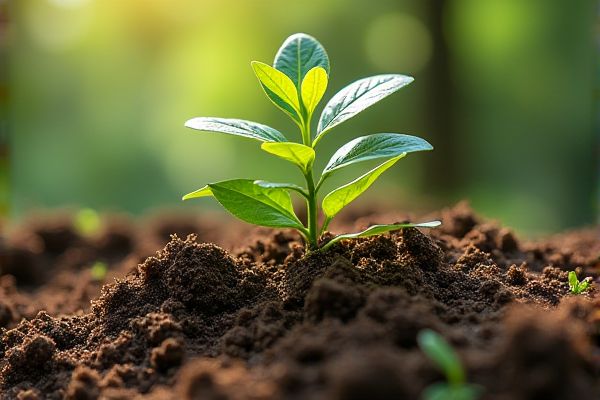
Compost tea enriches your soil with natural nutrients and beneficial microbes, promoting healthier plant growth without harmful chemicals. Explore the rest of the article to discover why compost tea could be a superior choice for your gardening needs compared to traditional chemical fertilizers.
Table of Comparison
| Aspect | Compost Tea | Chemical Fertilizer |
|---|---|---|
| Source | Organic matter, brewed from compost | Synthetic chemicals, manufactured compounds |
| Soil Health | Enhances microbial activity and soil structure | Can degrade soil quality over time |
| Nutrient Release | Slow and sustained nutrient release | Rapid nutrient availability |
| Environmental Impact | Eco-friendly, reduces pollution | Potential for runoff and pollution |
| Plant Growth | Promotes healthy root development and disease resistance | Boosts quick growth and high yield |
| Cost | Low cost, can be homemade | Variable; typically higher and recurring expense |
| Application Frequency | Requires frequent applications for best results | Less frequent applications needed |
Introduction to Compost Tea and Chemical Fertilizer
Compost tea is a nutrient-rich liquid produced by steeping organic compost in water, promoting beneficial microbial activity and enhancing soil health. Chemical fertilizers are synthetic substances formulated to provide specific nutrients like nitrogen, phosphorus, and potassium directly to plants for rapid growth. While compost tea improves soil structure and biodiversity, chemical fertilizers offer precise nutrient delivery with immediate effects on plant productivity.
What is Compost Tea?
Compost tea is a nutrient-rich liquid brewed from compost that contains beneficial microorganisms, organic matter, and essential nutrients to enhance soil health and plant growth. Unlike chemical fertilizers, compost tea improves soil structure and biodiversity while providing a natural source of nutrients without harmful residues. Using compost tea can boost your garden's resilience and nutrient absorption more sustainably than synthetic alternatives.
Understanding Chemical Fertilizers
Chemical fertilizers provide plants with concentrated nutrients like nitrogen, phosphorus, and potassium, essential for rapid growth and high yields. These synthetic compounds are designed for immediate nutrient availability but can lead to soil degradation and reduced microbial activity over time. Understanding the impact of chemical fertilizers helps you make informed decisions about sustainable nutrient management for healthier crops and soil.
Nutrient Content and Availability
Compost tea provides a rich array of nutrients including nitrogen, phosphorus, potassium, and trace minerals in organic forms that enhance soil microbial activity and improve nutrient availability over time. Chemical fertilizers supply precise, concentrated amounts of specific nutrients that are immediately available to plants but may lack micronutrients and can lead to nutrient leaching. The microbial life stimulated by compost tea contributes to sustained nutrient cycling, promoting long-term soil fertility and plant health compared to the short-term nutrient boost from chemical fertilizers.
Impact on Soil Health
Compost tea enhances soil health by introducing beneficial microorganisms that improve nutrient cycling, soil structure, and water retention, promoting long-term fertility and resilience. Chemical fertilizers often provide immediate nutrient availability but can disrupt soil microbial communities, leading to reduced soil biodiversity and increased risk of nutrient leaching. Over time, reliance on chemical fertilizers may degrade soil organic matter and harm soil health, whereas compost tea supports sustainable soil ecosystem functions.
Effects on Plant Growth
Compost tea enhances plant growth by improving soil microbial activity and nutrient availability, leading to stronger root systems and increased disease resistance. Chemical fertilizers provide immediate nutrient supply but can cause long-term soil degradation and nutrient imbalances. You can achieve healthier and more sustainable plant growth by using compost tea as a natural alternative to chemical fertilizers.
Environmental Considerations
Compost tea enhances soil health by promoting beneficial microbial activity and reducing the need for synthetic chemicals, which often contribute to water pollution and soil degradation. Chemical fertilizers can lead to nutrient runoff, causing harmful algal blooms and disrupting aquatic ecosystems. Your choice of compost tea supports sustainable agriculture by improving nutrient cycling and minimizing environmental impact.
Ease of Application and Cost
Compost tea offers ease of application through simple foliar sprays or soil drenches using basic equipment, making it accessible for small-scale gardeners and organic practices. Chemical fertilizers often require precise measurements and timing, increasing labor and the need for protective gear, which can complicate application. Cost-wise, compost tea is generally more affordable, leveraging recycled organic waste, whereas chemical fertilizers involve higher upfront expenses and ongoing costs tied to synthetic manufacturing.
Organic vs. Conventional Gardening Perspectives
Compost tea offers a rich blend of beneficial microorganisms that enhance soil health and promote sustainable plant growth, contrasting sharply with chemical fertilizers that supply nutrients but may degrade soil quality over time. Organic gardening prioritizes compost tea for its natural nutrient cycling and improved soil structure, while conventional gardening relies on chemical fertilizers for rapid nutrient availability and high yield. Choosing compost tea aligns with your commitment to eco-friendly practices and long-term soil vitality, whereas chemical fertilizers focus on immediate crop nutrition.
Choosing the Best Fertilizer for Your Garden
Compost tea enhances soil health by introducing beneficial microbes, improving nutrient availability and plant resilience, while chemical fertilizers provide immediate nutrient boosts but can degrade soil quality over time. Organic options like compost tea support sustainable gardening, promoting long-term growth and reducing environmental impact. Your choice should balance immediate plant needs with soil vitality for a thriving garden ecosystem.
 homyna.com
homyna.com